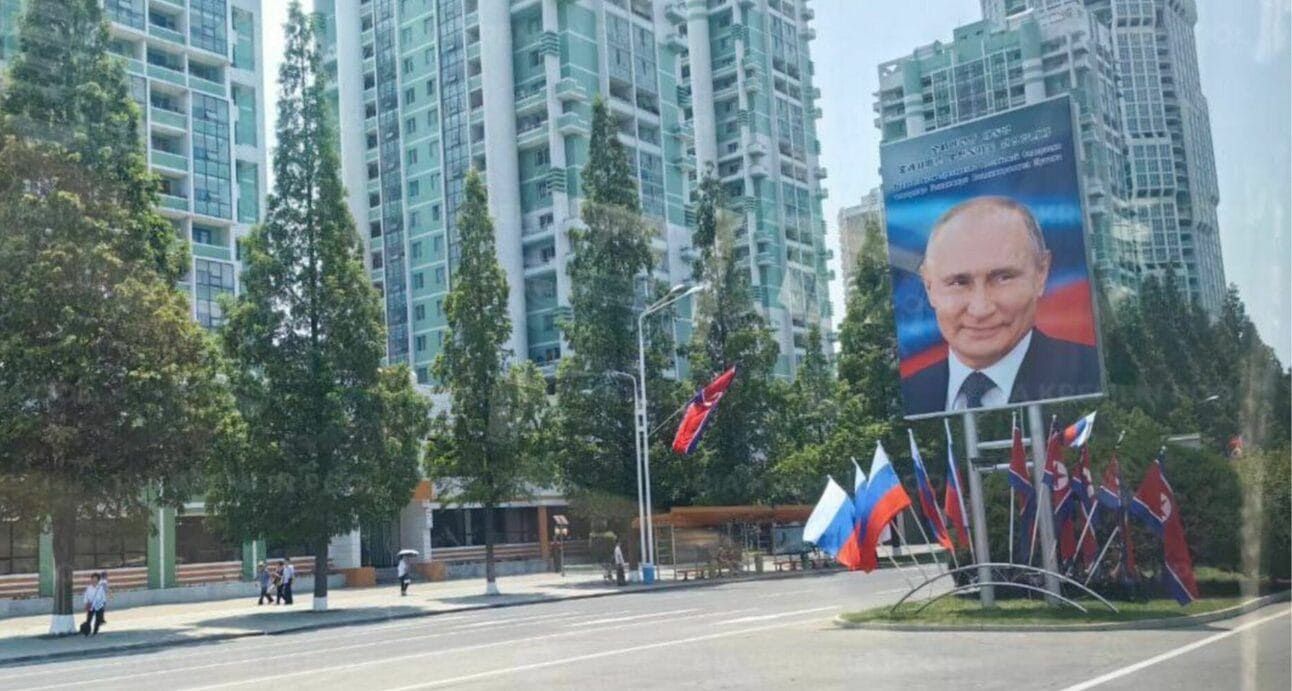Portraits of Russian President Vladimir Putin adorned the streets as he arrived in North Korea’s capital of Pyongyang yesterday (Tuesday). It’s his first trip to the North (aka DPRK) in 24 years.
Once upon a time, Putin travelled everywhere, making stops in Brazil, chatting with the Pope in Rome, and dropping in for “long lunches” in Versailles. But since he invaded Ukraine and the International Criminal Court issued a warrant for his arrest, Putin’s itinerary has shrunk.
That’s where North Korea comes in. Both Putin and his counterpart Kim Jong Un are now pariahs in much of the world, so they have plenty of reasons to get along, though neither gives the other a ‘free lunch’, if you will (and yes, we will).
Stay on top of your world from inside your inbox.
Subscribe for free today and receive way much more insights.
Trusted by 114,000+ subscribers
No spam. No noise. Unsubscribe any time.
So let’s dive in.
Why does Moscow need Pyongyang?
Putin is known to arrive late and leave world leaders twiddling their thumbs, but for Kim Jong Un, he’s now shown up early. And that’s not because he booked himself a last-minute slot for one of the hermit state’s 15 approved haircuts.
It’s because Putin needs weapons. Much has been made of the Russian war machine, but satellite imagery shows depletion at his open-air arms depots. So…
- The claim:In the 850 days since Russia invaded Ukraine, 50 countries have accused North Korea of providing arms shipments for Putin’s war. The wonks at a London-based think tank have even detailed the precise shipment coordinates and dates of several such shipments.
- The response: Kim Jung Un’s sister has called the claim “the most absurd paradox”, though Putin and Kim pledged to deepen their military ties last year, and Kim has called Putin a “comrade-in-arms”. Plus, we couldn’t help but notice when Russia blocked further UN scrutiny of North Korea’s sanctions violations in March, a move Ukraine’s foreign minister described as a “guilty plea”.
- The context:If you’re wondering why North Korea, a state of 26 million isolated and impoverished people, can a) manufacture arms, b) at scale, and c) supply them to others, remember that North and South Korea are still technically at war. This feeds a siege mentality that Kim uses to sustain his family’s power. So he spends a quarter of his GDP on defence, while many NATO countries are still struggling to hit 2%.
Then why does Pyongyang need Moscow?
When Putin sent a luxury Aurus Senat limousine to North Korea in February, Kim’s influential sister called the gift “perfect.” But the 18 known official visits between the two neighbours this year alone make clear this is all about business.
From Kim’s perspective, he needs a) technology, b) cash, and c) solidarity.
- On the tech front,Kim anchors his legitimacy in his nuclear and ballistic missile capability, but his isolation makes developing and maintaining that capability difficult. So he sees Putin as a way to fill that gap. This helps explain why Putin hosted him at a satellite launch centre last year, and why the North’s science and tech chief visited Russia last month.
- On the cash front, Kim has long sent workers abroad to funnel foreign currency back into his arms program. Despite sanctions, there are now ~100,000 such workers across 40 countries, earning Pyongyang ~$500M per year. Russia is now welcoming more, and its ambassador in Pyongyang has even suggested (🇷🇺) they could help with “reconstruction efforts“ in occupied Ukraine.
- And on the solidarity front, Kim and Putin are now running the world’s fourth-most and most-sanctioned countries, respectively. But while Putin – with a permanent UN Security Council seat – is meant to be enforcing many of those sanctions against the North, reports are just emerging that he’s now instead signed an agreement with Kim featuring a mutual defence clause.
So while the media landscapes in Russia and North Korea will limit our visibility of the visit’s substance, there are still plenty of signs for all to see.
INTRIGUE’S TAKE
As much as Putin likes to signal strength, it’s hard to see how his first trip to the hermit kingdom in 24 years doesn’t signal a solid degree of desperation.
But desperation can be dangerous in its own way, and it’s particularly intriguing when it forms part of a broader whole: the emerging military, financial, and political cooperation among Iran, Russia, DPRK, and China.
You may wonder… what do these states even have in common? A proto-fascist theocracy, a neo-imperialist kleptocracy, a Juchist family dictatorship, and a Marxist-Leninist-led hybrid. The answer is, of course, very little.
But a big thing they do share is this: they chafe at the world order and particularly its lead sponsor, the US. That’s what spurs not only their support for Russia, but also their dependence on China (the North’s sole formal ally, Russia’s main economic lifeline, and the buyer of 90% of Iran’s oil).
But let’s be clear – we’re still seeing rank self-interest at play between them: China, for example, is currently squeezing Putin on gas prices and volumes.
So yes, history will be shaped by how the rest of the world responds to this emerging axis. But it’ll also be shaped by the degree to which this disparate axis can cooperate meaningfully over the longer term.
Also worth noting:
- Before touching down in Pyongyang, Putin penned an editorial for the North’s main state newspaper, pledging solidarity against US-led sanctions.
- The North’s state media (KCNA) has waxed poetic about Putin’s visit: “Passing through charmingly lit streets of Pyongyang at night, the top leaders exchanged their pent-up inmost thoughts”.
- Putin today heads to Vietnam, which has largely avoided criticising Russia’s invasion of Ukraine. Historically, Vietnam has found value in Russia as a counterbalance to neighbouring China.








